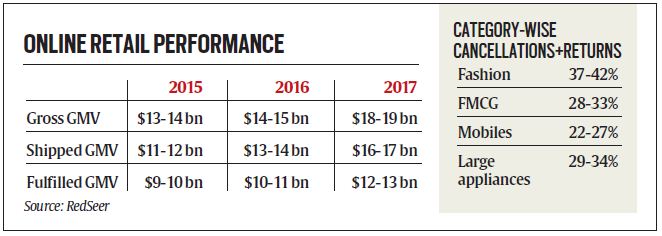
Driven mainly by an increase in the number of shoppers from tier-II and lower category cities, the e-commerce sector in India touched a gross merchandise volume (GMV) close to $20 billion during 2017, according to a note by research firm RedSeer, which said that going ahead these new shoppers will continue to stick to online platforms and new users will adopt online shopping due to low data tariffs. However, of the $18.6 billion GMV clocked by the Indian e-commerce industry during the year, over 30 per cent was lost due to cancellations and returns of orders.
GMV is a term used in online retailing to indicate a total sales value for merchandise sold through a platform. It is considered to be a key metric by e-commerce players on the basis of which they measure their growth in the market and to also determine growth of online retail consumption. Experts have suggested time and again that e-commerce companies need to move away from their business model of raising funds from investors on the basis of GMV given that most of the companies have still not managed to break even due to high marketing costs incurred on account of heavy discounts.
Amazon’s India unit, after being in the third spot for a long time behind Flipkartand Snapdeal has clawed its way up to the top in terms of GMV and as per a recent note by Forrester Research, was only 1 per cent behind Flipkart in GMV market share during 2017. This is compared with a 5 per cent difference in market share between Flipkart and Amazon a year ago. However, as a group, which includes entities such as Jabong and Myntra, Flipkart had a clear leadership.
“After surpassing Flipkart in 2016 for the first time (in metropolitan user preference), Amazon has strengthened its position as metropolitan Indian consumers’ preferred online retail destination and is aggressively closing the gap with Flipkart to become the single-largest online retailer in India in terms of sales,” the Forrester report said.

According to RedSeer’s Associate General Manager Vaibhav Arora, the highest cancellations and returns were seen in the fashion category where 37-42 per cent of all orders in India end up being either cancelled or returned. This is followed by the large appliances category with 29-34 per cent, FMCG with cancellations at 28-33 per cent and mobiles at 22-27 per cent .
“We feel the industry needs to focus on ensuring the right products get delivered as 30 per cent is good amount of revenue to be lost,” RedSeer said.
“The reasons for cancellations is mainly change of mind which happens the most in fashion as the customer comes across something better and cancels an ordered item and orders the new one. Returns on the other hand is mainly due to incorrect product being delivered or the product delivered being very different from the one ordered,” Arora told The Indian Express.
As per the research firm, the e-tailing industry is currently witnessing the highest penetration from mobile and large appliances. This is driven by behaviour of users buying standardised products with reliable delivery experience.
FMCG which currently has the lowest penetration is a key growth category for the players and is expected to have a higher growth in 2018, it said.
No comments:
Post a Comment